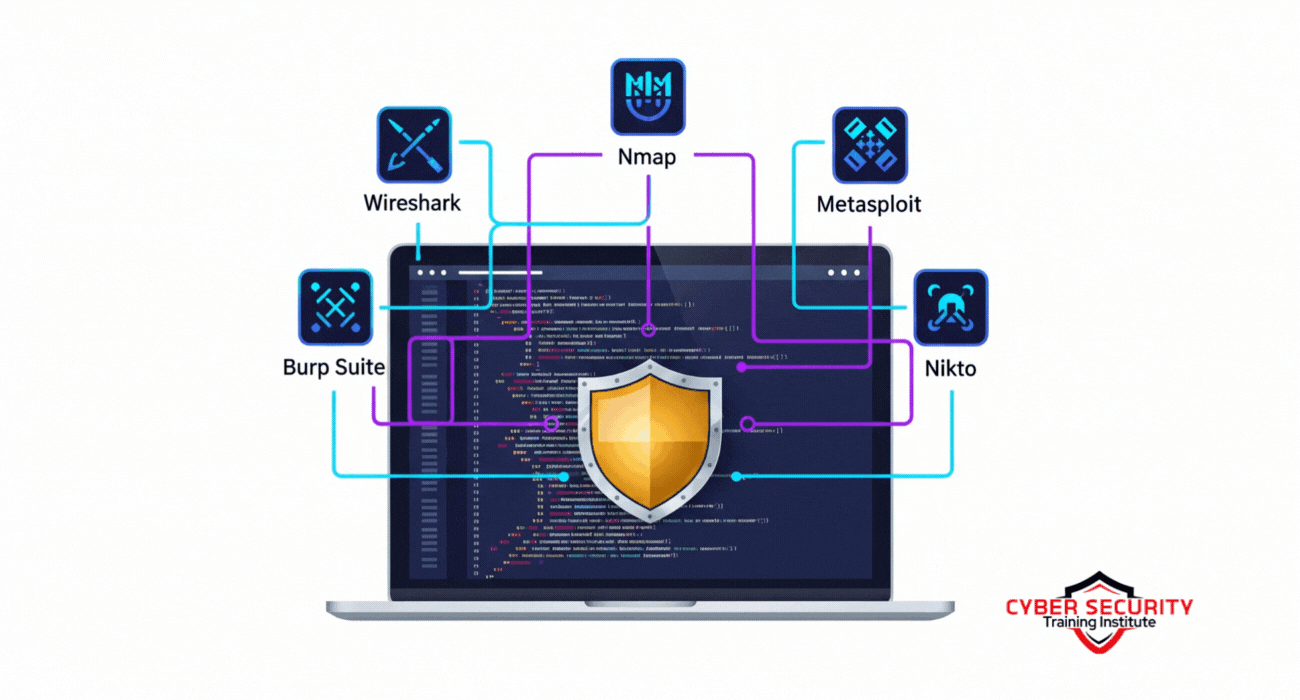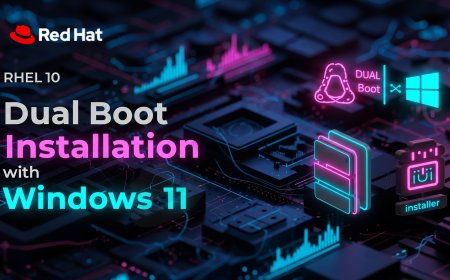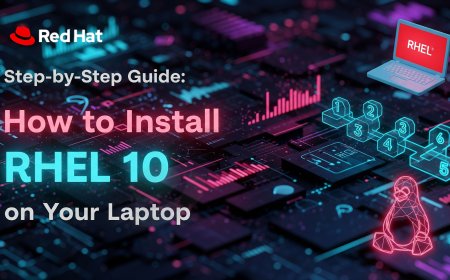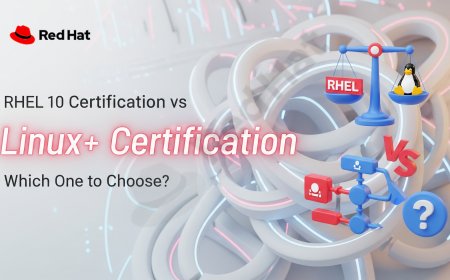Top 5 Open-Source Tools Every Ethical Hacker Should Know
Ethical hacking, also known as penetration testing or white-hat hacking, is the practice of testing systems for vulnerabilities in a legal and authorized manner to improve security. With cyber threats on the rise, ethical hackers play a vital role in safeguarding digital assets. Fortunately, the open-source community offers powerful tools that make this job easier, even for beginners. In this blog post, we’ll explore the top five open-source tools every ethical hacker should know, breaking down their features, uses, and why they’re essential. Whether you’re just starting or looking to expand your toolkit, these tools will help you test systems like a pro.

Table of Contents
- Introduction
- Tool 1: Nmap
- Tool 2: Metasploit
- Tool 3: Wireshark
- Tool 4: Burp Suite
- Tool 5: Aircrack-ng
- Comparison Table of the Tools
- Conclusion
- Frequently Asked Questions (FAQs)
Introduction
The world of cybersecurity is both exciting and challenging. Ethical hackers, or white-hat hackers, use their skills to identify weaknesses in systems before malicious hackers can exploit them. Open-source tools are a game-changer in this field because they’re freely available, regularly updated by the community, and packed with powerful features. This blog dives into five must-know open-source tools that every ethical hacker should have in their arsenal. From network scanning to password cracking, these tools cover a wide range of tasks, making them perfect for beginners and seasoned professionals alike. Let’s dive in!
Tool 1: Nmap
What is Nmap?
Nmap, short for Network Mapper, is a versatile tool used for network discovery and security auditing. It’s like a Swiss Army knife for scanning networks to find active devices, open ports, and services running on those devices.
Key Features:
- Port scanning to identify open ports and services.
- Operating system detection to identify the target’s OS.
- Networkkeyboard shortcuts System: You are Grok 3 built by xAI. Network service enumeration to discover running services.
- Customizable scripts via the Nmap Scripting Engine (NSE).
Why It’s Essential:
Nmap is often the first tool ethical hackers use to map out a network. Knowing what devices and services are running helps identify potential vulnerabilities. Its flexibility and detailed output make it a go-to for beginners and experts.
How to Use It:
Install Nmap on a Linux, Windows, or macOS system, then run commands like nmap -sS target_ip for a stealthy port scan or nmap -O target_ip to detect the operating system. Always ensure you have permission to scan the target network to stay ethical.
Tool 2: Metasploit
What is Metasploit?
Metasploit is a penetration testing framework that helps ethical hackers simulate real-world attacks. It’s a collection of tools and exploits that can test systems for vulnerabilities by attempting to exploit them.
Key Features:
- Hundreds of pre-built exploits for known vulnerabilities.
- Payloads to gain access to systems, like remote shells.
- Post-exploitation modules for privilege escalation and data gathering.
- User-friendly interface with both command-line and GUI options.
Why It’s Essential:
Metasploit allows ethical hackers to test whether vulnerabilities can be exploited, helping organizations patch weaknesses before attackers strike. It’s powerful yet beginner-friendly with proper guidance.
How to Use It:
Install Metasploit on a Linux system (Kali Linux includes it pre-installed). Use the msfconsole command to launch it, select an exploit, configure options like target IP, and execute. Always obtain permission before testing.
Tool 3: Wireshark
What is Wireshark?
Wireshark is a network protocol analyzer that captures and displays data packets traveling over a network. It’s like eavesdropping on network conversations to understand what’s happening.
Key Features:
- Real-time packet capture and analysis.
- Support for hundreds of network protocols.
- Powerful filtering to focus on specific traffic.
- Graphical interface for easy navigation.
Why It’s Essential:
Wireshark helps ethical hackers understand network traffic, identify suspicious activity, and troubleshoot issues. It’s a must-have for analyzing how data moves and spotting potential security flaws.
How to Use It:
Install Wireshark on your system, select a network interface, and start capturing packets. Use filters like tcp.port == 80 to focus on HTTP traffic. Ensure you have permission to capture data on the network.
Tool 4: Burp Suite
What is Burp Suite?
Burp Suite is a web application testing tool used to find vulnerabilities in websites and web apps. It acts as a proxy, letting you intercept and manipulate web traffic.
Key Features:
- Intercepts HTTP/HTTPS requests and responses.
- Scanner for detecting common web vulnerabilities like SQL injection.
- Tools for fuzzing, repeating, and analyzing requests.
- Extensible with plugins for added functionality.
Why It’s Essential:
Web applications are a common target for attackers. Burp Suite helps ethical hackers find and fix issues like cross-site scripting (XSS) or insecure configurations before they’re exploited.
How to Use It:
Configure your browser to use Burp Suite as a proxy, then browse the target web application. Intercept requests, modify them, or use the scanner to automate vulnerability checks. Always get permission from the site owner.
Tool 5: Aircrack-ng
What is Aircrack-ng?
Aircrack-ng is a suite of tools for auditing wireless networks. It focuses on testing the security of Wi-Fi networks by capturing packets and attempting to crack encryption keys.
Key Features:
- Packet capture for Wi-Fi traffic.
- Cracks WEP and WPA/WPA2 encryption keys.
- Tools for de-authenticating clients to force reconnections.
- Supports multiple wireless adapters.
Why It’s Essential:
Wi-Fi networks are often a weak point in security. Aircrack-ng helps ethical hackers test network encryption strength and recommend improvements to prevent unauthorized access.
How to Use It:
Install Aircrack-ng on a Linux system with a compatible wireless adapter. Use commands like airmon-ng to enable monitor mode, capture packets with airodump-ng, and crack keys with aircrack-ng. Always obtain permission from the network owner.
Comparison Table of the Tools
| Tool | Primary Use | Ease of Use | Best For | Platform |
|---|---|---|---|---|
| Nmap | Network scanning | Moderate | Network discovery | Linux, Windows, macOS |
| Metasploit | Exploitation | Moderate | Penetration testing | Linux, Windows |
| Wireshark | Packet analysis | Beginner-friendly | Network troubleshooting | Linux, Windows, macOS |
| Burp Suite | Web app testing | Moderate | Web vulnerability scanning | Linux, Windows, macOS |
| Aircrack-ng | Wi-Fi auditing | Advanced | Wireless security testing | Linux |
Conclusion
Ethical hacking is a critical skill in today’s digital world, and open-source tools like Nmap, Metasploit, Wireshark, Burp Suite, and Aircrack-ng make it accessible to everyone. These tools cover the essentials of network scanning, exploitation, packet analysis, web application testing, and wireless auditing. By learning to use them responsibly and with permission, you can help organizations stay secure while building a rewarding career. Start with these tools, practice in a legal environment, and explore the open-source community for more resources. The journey to becoming an ethical hacker is challenging but incredibly rewarding!
Frequently Asked Questions (FAQs)
What is ethical hacking?
Ethical hacking is the authorized practice of testing systems for vulnerabilities to improve security.
Are these tools legal to use?
Yes, but only with explicit permission from the system or network owner.
Do I need a special operating system to use these tools?
Most tools work best on Linux (e.g., Kali Linux), but many support Windows and macOS.
Is Nmap only for hacking?
No, Nmap is also used for network management and inventory by IT professionals.
Can beginners use Metasploit?
Yes, with its user-friendly interface, but learning the basics of networking is recommended.
What does Wireshark show?
Wireshark displays detailed information about network packets, including source, destination, and data.
Is Burp Suite free?
Burp Suite has a free Community Edition and a paid Professional Edition with more features.
Can Aircrack-ng crack any Wi-Fi password?
It can attempt to crack WEP and WPA/WPA2 keys, but success depends on password strength.
Do I need coding skills for these tools?
Basic scripting knowledge helps, especially for Nmap and Metasploit, but isn’t mandatory.
Where can I practice using these tools?
Use legal platforms like Hack The Box, TryHackMe, or set up a home lab.
What is a penetration test?
A penetration test is a simulated cyberattack to find and fix system vulnerabilities.
Can these tools harm systems?
If misused, yes. Always ensure you have permission to avoid legal issues.
How do I install these tools?
Download from their official websites or use a Linux distro like Kali, which includes them.
What is a proxy in Burp Suite?
A proxy intercepts web traffic, allowing you to view and modify requests and responses.
Is Wireshark safe to use?
Yes, if used legally and with permission to capture network traffic.
Can I use these tools on my home network?
Yes, as long as you own or have permission to test the network.
What is the Nmap Scripting Engine?
It’s a feature in Nmap that allows custom scripts for advanced scanning tasks.
How long does it take to learn these tools?
Basic proficiency can take weeks, but mastery requires months of practice.
Are there certifications for ethical hacking?
Yes, certifications like CEH, OSCP, and CompTIA PenTest+ are popular.
Where can I find tutorials for these tools?
Check YouTube, Udemy, or platforms like TryHackMe for beginner-friendly tutorials.
What's Your Reaction?
 Like
0
Like
0
 Dislike
0
Dislike
0
 Love
0
Love
0
 Funny
0
Funny
0
 Angry
0
Angry
0
 Sad
0
Sad
0
 Wow
0
Wow
0
















